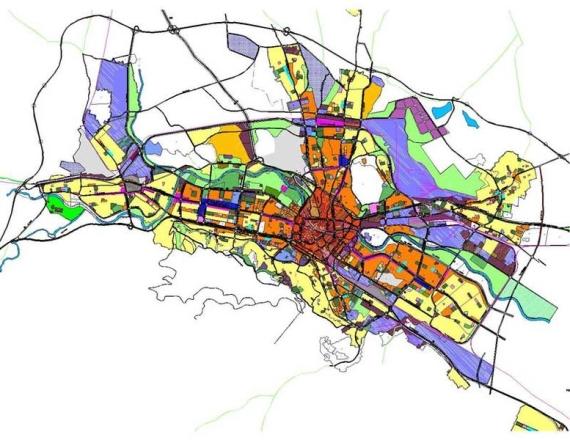Investing in an Existing Property with Land for Sale
Posted: December 27, 2015 by LandCentury

There are times when you may want to buy land, but there's a structure on the property. Youre essentially buying a property with land for sale, but you have no intentions of using the structure on the property. Many investors will shy away from this because they assume that it will cost too much money to either repair the structure, or to tear down.
But there are times when the land is simply too valuable for you to pass up on the deal. This is when you need to assess the situation and understand the benefits of owning a piece of property with the majority of your propertys value being in the land and not the actual structure. There are even properties for sale where the listings states that the structure will need to be torn down, and this is, essentially, you buying the property minus the cost of the structure in most cases.
When to Buy Land Even If a Structure Exists
Land is valuable there's no denying that. However, in most cases, having a structure on the property increases the value of the land. When a structure is not able to be lived in or is in disarray, this means that the land is probably more valuable than the structure itself.
There are some things you need to consider when trying to determine if the investment will be a smart one:
* Current market value for land
* The price it will cost to repair or knockdown the structure
If the land is discounted, which it should be if you do need to tear down the structure, you may be getting a great value on the land itself. Whether a barn or a home exists on the property, if it is in disarray, you will need to deduct this from the total cost of the property. You want to make sure that the land itself is worth what the seller is asking for. And there actually a lot of benefits to buying a property that has a home even if it is not in good condition.
Structural Benefits
If a home exists on the property or another building, there is a high likelihood that there is a road leading up to the home, which is a major benefit for land sellers. Youll also want to consider that the following may be in place:
* Water lines
* Septic systems
* Electrical and utility lines
All of these are major bonuses if you want to actually build on the land or sell it in the future. Having utility lines, road access, septic systems and water lines increases the value of the property dramatically. If you do choose to build on the property yourself, you will do so at a much higher discount because you dont need to have these utility lines run your home.
Essentially, you're cutting down the work that you need to perform if you want to build on the property.
You also have the benefit of there being a foundation in place if you wanted to build a very similar home. You also need to think about the value that is inside the home itself. You may actually be able to rebuild the home or renovate it to a state that is livable even exceptional in some cases. But you also need to consider the cost of restoring the property.
Let's say that you purchase a property for $50,000, and the going rate for homes on similar property is $300,000. If it costs you even $100,000 to renovate the home, youll be making a hefty profit of $150,000 on the property. Of course, realtor fees and other fees will need to be deducted from this total, but it is a much higher return than selling land itself. And this is that not to say that land itself will not be valuable.
You may find that it's simply unfeasible to build on land because it would not lead to an acceptable return on investment. This is probably fine, but youll want to ensure that the land in the area is:
* Highly in demand
* Holding its value
* Increasing in price
If a home exists on the property and you need to tear it down, you also need to consider this cost into your purchase.
Demolition Costs
There's a structure on the property that's not in good condition. The structure may even be in such disarray that it causes a legal hazard to the owner you. If a person was to enter onto the property and got injured because the home itself was not properly cared for, you may be held liable as a result. Demolishing the home may be the smartest choice for you.
Looking at the average cost of demolition will give you a good indication are what you can expect to spend on a complete teardown.
* The low end cost of the teardown is $8,000.
* The high end cost of a teardown is $15,000.
If you're very savvy, you can recuperate some of these costs through recycling the contents of the home. You may be able to sell the beautiful windows that would otherwise be demolished, or you may be able to strip out all of the copper piping, which holds value. Demolition may be a smart choice. If homes in the area are selling for $900,000, but you purchase the property for $100,000 and building a functional home will only cost $300,000, you made one heck of an investment.
If you're lucky enough to find a piece of property that's in a highly populated area, such as Chicago, you want to buy the property as fast as possible if it's a good deal. These are areas where the prices of houses are immense, and there's such a lack of properties on the market, your land value will increase dramatically. Youll even have people calling you and sending in offers that are well above market value if the property is in a desirable location. Investing in a property with land for sale can be a very smart, long-term investment if you follow the advice above.
But there are times when the land is simply too valuable for you to pass up on the deal. This is when you need to assess the situation and understand the benefits of owning a piece of property with the majority of your propertys value being in the land and not the actual structure. There are even properties for sale where the listings states that the structure will need to be torn down, and this is, essentially, you buying the property minus the cost of the structure in most cases.
When to Buy Land Even If a Structure Exists
Land is valuable there's no denying that. However, in most cases, having a structure on the property increases the value of the land. When a structure is not able to be lived in or is in disarray, this means that the land is probably more valuable than the structure itself.
There are some things you need to consider when trying to determine if the investment will be a smart one:
* Current market value for land
* The price it will cost to repair or knockdown the structure
If the land is discounted, which it should be if you do need to tear down the structure, you may be getting a great value on the land itself. Whether a barn or a home exists on the property, if it is in disarray, you will need to deduct this from the total cost of the property. You want to make sure that the land itself is worth what the seller is asking for. And there actually a lot of benefits to buying a property that has a home even if it is not in good condition.
Structural Benefits
If a home exists on the property or another building, there is a high likelihood that there is a road leading up to the home, which is a major benefit for land sellers. Youll also want to consider that the following may be in place:
* Water lines
* Septic systems
* Electrical and utility lines
All of these are major bonuses if you want to actually build on the land or sell it in the future. Having utility lines, road access, septic systems and water lines increases the value of the property dramatically. If you do choose to build on the property yourself, you will do so at a much higher discount because you dont need to have these utility lines run your home.
Essentially, you're cutting down the work that you need to perform if you want to build on the property.
You also have the benefit of there being a foundation in place if you wanted to build a very similar home. You also need to think about the value that is inside the home itself. You may actually be able to rebuild the home or renovate it to a state that is livable even exceptional in some cases. But you also need to consider the cost of restoring the property.
Let's say that you purchase a property for $50,000, and the going rate for homes on similar property is $300,000. If it costs you even $100,000 to renovate the home, youll be making a hefty profit of $150,000 on the property. Of course, realtor fees and other fees will need to be deducted from this total, but it is a much higher return than selling land itself. And this is that not to say that land itself will not be valuable.
You may find that it's simply unfeasible to build on land because it would not lead to an acceptable return on investment. This is probably fine, but youll want to ensure that the land in the area is:
* Highly in demand
* Holding its value
* Increasing in price
If a home exists on the property and you need to tear it down, you also need to consider this cost into your purchase.
Demolition Costs
There's a structure on the property that's not in good condition. The structure may even be in such disarray that it causes a legal hazard to the owner you. If a person was to enter onto the property and got injured because the home itself was not properly cared for, you may be held liable as a result. Demolishing the home may be the smartest choice for you.
Looking at the average cost of demolition will give you a good indication are what you can expect to spend on a complete teardown.
* The low end cost of the teardown is $8,000.
* The high end cost of a teardown is $15,000.
If you're very savvy, you can recuperate some of these costs through recycling the contents of the home. You may be able to sell the beautiful windows that would otherwise be demolished, or you may be able to strip out all of the copper piping, which holds value. Demolition may be a smart choice. If homes in the area are selling for $900,000, but you purchase the property for $100,000 and building a functional home will only cost $300,000, you made one heck of an investment.
If you're lucky enough to find a piece of property that's in a highly populated area, such as Chicago, you want to buy the property as fast as possible if it's a good deal. These are areas where the prices of houses are immense, and there's such a lack of properties on the market, your land value will increase dramatically. Youll even have people calling you and sending in offers that are well above market value if the property is in a desirable location. Investing in a property with land for sale can be a very smart, long-term investment if you follow the advice above.




